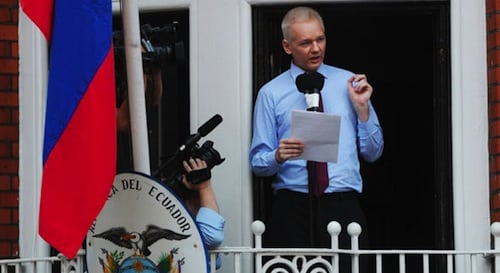In a truly astounding misstep, the United States Attorney’s Office in Eastern Virginia filed a document that referenced an indictment against the WikiLeaks founder, Julian Assange. The filng in an unrelated court filing seems to confirm that charges are pending or planned against Assange but the Justice Department will only say that “The court filing was made in error.” The charges would raise serious first amendment questions over whether it is a crime to publish hacked emails if you were not a party to the hacking. Wikileaks maintains that it was performing a journalistic function.
Mr. Assange, for the moment, remains in the Ecuadorean Embassy in London.
The disclosure was made in a recently unsealed filing in an unrelated sex-crimes case against Seitu Sulayman Kokayi for allegedly coercing and enticing an underage person to engage in unlawful sexual activity. The most shocking aspects of this controversy would be if prosecutors simply cut and pasted material from an Assange filing — a practice that is common. I have been in cases where prosecutors literally copied material from wholly unrelated cases describing crimes and search areas that had nothing to do with my client.
In this filing, the prosecutors wrote “Another procedure short of sealing will not adequately protect the needs of law enforcement at this time because, due to the sophistication of the defendant and the publicity surrounding the case, no other procedure is likely to keep confidential the fact that Assange has been charged.”
The constitutional issues surrounding such a filing could have great impact on the protections afforded both citizens and particularly journalists. With reports of Ecuador pushing Assange out the door in London into the arms of awaiting police, these issues may soon be actual rather than rhetorical.
Here is the filing: DOJ filing.
Reprinted with permission from JonathanTurley.org.


